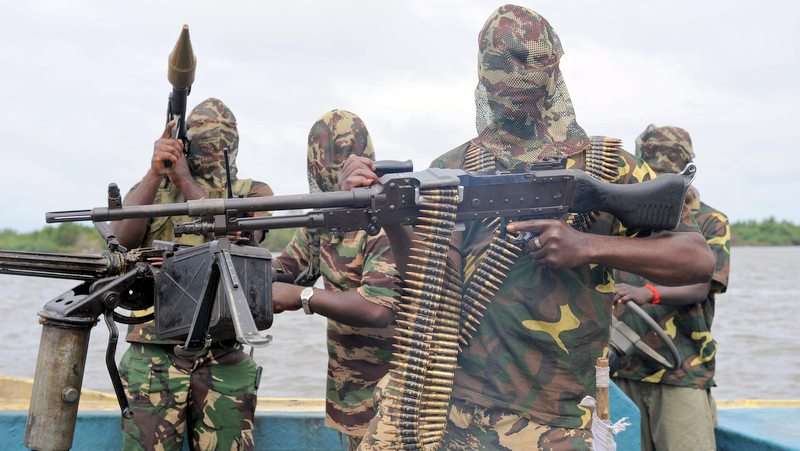- N’Delta Militants Might Return to Creeks, Clark Warns Buhari
A critical stakeholder in the Ijaw nation and leader of the Pan-Niger Delta Forum (PANDEF), Chief E.K. Clark has warned that Niger Delta militias might return to the creeks and resume hostilities if the federal government holds out too long on the issue of dialogue with the agitators.
He stated this in his country home, Kiagbodo in Delta State this week while receiving the newly sworn-in executives of Izon-Ebe Oil and Gas Producing Communities Association (IOGPCA) – an association of oil and gas contractors of Ijaw extraction that cut across the entire oil-rich region.
According to Clark, “It is getting late for President Muhammadu Buhari and the federal government on the issue of dialogue with the aggrieved Niger Delta agitators who have stopped the bombing of pipelines and other oil facilities.
“If the dialogue fails to commence as soon as possible, the boys may feel betrayed and go back to the creeks and resume hostilities.
“I saw the president’s media man (Femi Adesina) claiming that we are not one and not united, and that the federal government was still looking for people to negotiate with.
“That was a great insult to us. I was in government before he was born. On July 30, 2016, I summoned a meeting of all Ijaw leaders and traditional rulers to my house in Warri and the Deputy Governor of Delta State was in attendance.
“After that first meeting, I decided to call for another one with paid adverts in national dailies, since it was not only the Ijaws that have oil and gas.”
The Ijaw leader added that at that meeting, which was held at the Petroleum Training Institute (PTI) Effurun, with over 500 delegates in attendance, the Ijaw leaders advised the agitators to lay down their arms and stop the destruction and vandalism of oil and gas facilities.
Clark added that after the meeting, the “boys in the creeks” quickly responded and mandated him to negotiate on their behalf, stating that on November 1, 2016, he led a delegation comprising traditional rulers, leaders, women and youth leaders from the Niger Delta to the Presidential Villa, Abuja, where they presented to the federal government a 16-point demand for dialogue and negotiations.
“Yet, this government is saying that it does not know whom to negotiate with. We are ready to negotiate, the earlier the better. Therefore we are using this opportunity of you coming to see me, to tell the federal government that it’s getting too late. We are Nigerians and we are nationalists,” the Ijaw leader warned.
The elder statesman also highlighted some of the educational benefits for the Ijaws under the amnesty programme, adding that of those who graduated from universities in 2015, four of them made first class, 26 made second class upper in Benson Idahosa University, Benin City in 2016, while 187 passed with second class upper and lower divisions.
He advised the association to maintain peace in expressing their grievances and should not let their enemies to divide them.
“Let us come together and fight our cause as one. I am happy that you realised that for us to achieve our aim we must come together and fight our common enemy,” Clark added.
On the issue of the Maritime University in Okerenkoko, Delta State, he also warned against the scrapping of the university, adding, “I do not see any reason why people are opposed to the Maritime University in Okerenkoko as this was something that was recommended as far back as 1998.”
He congratulated the association’s president, Hon. James Edoukumo and his executive members for their victory in their elections, and urged them to always respect their traditional rulers, elders and leaders.
Chief Clark, who said he will be 90 this year, said for the government to take the oil and gas from the Niger Delta, it should be ready to develop the region.


 Billionaire Watch3 weeks ago
Billionaire Watch3 weeks ago
 Startups4 weeks ago
Startups4 weeks ago
 News4 weeks ago
News4 weeks ago
 News4 weeks ago
News4 weeks ago
 Bitcoin4 weeks ago
Bitcoin4 weeks ago
 Naira4 weeks ago
Naira4 weeks ago
 Forex3 weeks ago
Forex3 weeks ago
 Treasury Bills4 weeks ago
Treasury Bills4 weeks ago
























